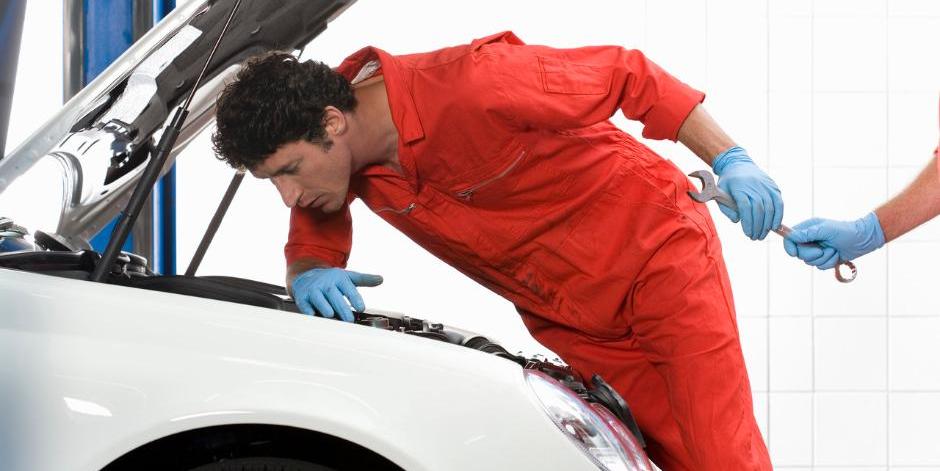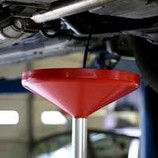
FAQs - Oil & Oil Changes
Q: How often should I change my oil?
A: Follow the instructions in your owner’s manual. Ask your store manager to print out the maintenance schedule for your make and model. Regular oil changes keep your engine running in top condition, save gas, and help you avoid major repairs. In fact, you can improve your gas economy by 5-6%, according to the U.S. Department of Energy, by keeping your car in shape and using the recommended grade of oil for your engine.*
Q: My owner’s manual recommends an oil change every 5,000 miles. Why might I bring my car in before that?
A: In the past, many auto makers based their maintenance schedule on normal versus “special operating conditions.” For example, if you own a 1999 Lincoln Continental, you normally change the oil every 5,000 miles. The Lincoln Continental owner’s manual recommends an oil change every 3,000 miles under special operating conditions, including towing or carrying heavy loads, extensive idling and/or driving at low speeds for long distances, driving in dusty conditions, and off-road operation. Ask your Tolker Auto Service store manager for a free factory maintenance print out for the make and model of your vehicle.
Q: How do regular oil changes save me money on gas?
A: A regular oil change is like a check-up at your doctor, essential to the health of your car or truck. For superior performance and cleaner emissions, today’s engines are designed to run at close tolerances and high temperatures. High quality motor oil, whether conventional or synthetic, reduces friction and actually removes heat from the engine. As long as your oil is clean, it prevents wear—maintaining the perfect lubrication between the fast-moving parts, such as your pistons—and ensures that you get the maximum miles for every gallon of gasoline that you burn. In fact, you can improve your gas economy by at least 5% by keeping your car properly tuned and using the recommended grade of oil for your engine.* Scheduled maintenance at Tolker Auto Service and our free engine and chassis inspections can help prevent major car repairs down the road.
Q: What’s the best oil for my car or truck?
A: Follow the oil specifications in your vehicle owner’s manual. Your Tolker Auto Servive service technician can provide you with the right recommendations based on your driving conditions and vehicle make, model, and mileage.
Q: How does high quality motor oil protect my engine?
A: Heat and friction is the enemy. Slippery motor oil not only reduces friction between the many fast-moving parts in your engine, but also actually removes heat from the pistons, shafts, and bearings. Think of your engine as the heart of your vehicle. Oil is the lifeblood. As soon as you turn the ignition key, a gear connected to the crankshaft or camshaft will activate the oil pump and propel oil to all of the moving parts before it returns to the oil pan at the bottom of your engine. High quality motor oil is especially important in today’s automobile engines, designed to operate at close tolerances and high temperatures—between 200 and 250 degrees F—for superior performance and cleaner emissions.
Q: How do I check the oil level in my vehicle?
A: You should check the oil every few hundred miles, or every other time you fill your gas tank. Consult your owner’s manual for the position of the oil dipstick and engine oil filler opening. The best time to check the oil is when your engine is warm and on level ground. Turn off the vehicle and wait a few minutes. Then pull out the dipstick, wipe it clean with a rag, and reinsert it. Push it all the way in. Pull out the dipstick, again. It will have either two notches or an indent to show the oil level. It’s best to keep the oil level at or near the top mark. If the oil is between the top and bottom mark, you may add oil. Below the bottom, add oil. At or above the top, do not add oil. Too much oil in your engine can actually cause problems. If you’re low, add oil a little at a time (no more than half a quart to a quart), then re-check. Be sure that the dipstick is all the way back in before you close the hood. It’s a good idea to keep at least one quart of oil in your garage and one in your trunk. The oil specifications for your make and model are in your owner’s manual. Or, stop by one of our stores. We would be happy to check your oil and top it off for free.
Q: I’ve always been told that I should use 10W-40 motor oil. Is this right?
A: While 10W-40 used to be considered the oil standard, most vehicles today use lighter weight oils, such as 5W-30. In fact, your vehicle warranty may be voided if you use 10W-40 motor oil. Consult your owner’s manual or visit Mr. Tire, Tread Quarters, or Autotire for the best recommendations for your car or truck.
Q: I have a high-mileage car. How can I best take care of my engine?
A: Regular maintenance, including oil changes, is the most cost-effective way to keep an older vehicle on the road. Lubricants can also help extend the life of your engine. If you find that you frequently have to add oil to your car or truck, you might be “burning oil.” Visit Tolker Auto Service for a diagnosis.
Q: I think my vehicle might be burning oil. What should I do?
A: Visit Tolker Auto Service for expert advice. You might be able to drive your car or truck as is, with more frequent oil changes, or you might want to invest in engine work, depending on how long you plan to own the vehicle.
Q: My oil pressure light is on. What do I do?
A: First of all, don’t ignore it. It could mean that you are dangerously low on oil. Turn off the engine and wait a few minutes. Then check the oil level. If your car is more than two quarts low, even if no oil shows on the dipstick, adding oil might resolve the issue. Low oil pressure also can mean a faulty oil pump, plugged screens or filters, leaking or burning oil, or a failed oil pressure sending unit. If adding oil does not take care of the problem, don’t drive your car. Have the vehicle towed to Tolker Auto Service for expert help.
Q: What about synthetic oil for my vehicle?
A: Today’s full synthetic and synthetic-mineral blends are excellent for tough conditions such as stop-and-go driving, frequent trips, and towing. And for engine fills and top-offs, they are considered equivalent or superior to conventional oil. In fact, many newer car and truck models specify synthetic oil. Consult your owner’s manual for oil specifications and a maintenance schedule. Or, speak to your Tolker Auto Service service technician about the best brand and grade for your car or truck and type of driving.
Q: My next oil change is also a major servicing. Can I have the work done at Tolker Auto Service?
A: Regular maintenance, including 30,000-60,000-90,000 scheduled maintenance, is essential to maintain your vehicle’s health and factory warranty. Your dealer does not need to perform this work. Our technicians are trained and qualified to perform most scheduled maintenance, at more convenient times and turn-arounds, and up to 50% less than your auto dealer.
*http://www.fueleconomy.gov/, the official U.S. government source for fuel economy information.


